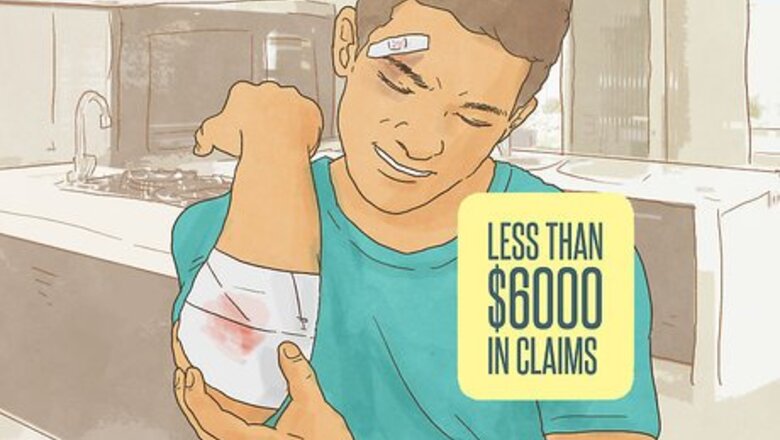
views
X
Trustworthy Source
State of Indiana
Official site for state-approved sources related to life in Indiana, including laws, services, and culture
Go to source
[2]
X
Trustworthy Source
State of Indiana
Official site for state-approved sources related to life in Indiana, including laws, services, and culture
Go to source
Preparing Your Claim

Make sure your issue is appropriate for small claims court. The court cannot hear your claim unless it has the power to resolve the issue. Generally, you must claim damages of less than $6,000 to file in small claims court in Indiana. For example, if you were injured, or your property was damaged, you can sue the person who hurt you or damaged your property. However, if your damages are worth more than $6,000, you cannot file your suit in small claims court.

Confirm you've chosen the proper county. Not only does the court need power over the subject matter of your claim, it also must have power over the person you're suing. Usually you will file your small claims case in the county where the person you're suing lives. You also can file in the county where the incident happened that is the subject matter of your lawsuit. For example, suppose you go to Indiana University in Bloomington. You want to sue your roommate in small claims court because when she moved out of your apartment at the end of the school year she owed you $300 in utilities. She incurred this debt while at school in Bloomington, which is in Monroe County. However, your roommate lives in Indianapolis. Therefore, you could sue your roommate either in the Monroe County small claims court or in the Marion County small claims court in Indy.

Determine the proper parties in your case. Before you file your claim, you must make sure you are naming all the defendants who are potentially responsible. If more than one person is responsible for your damages, you must include all of them in the same lawsuit. To return to the previous example, if your roommate's parents had co-signed the apartment lease with her, you might consider including them in your lawsuit for utilities because you can argue that they accepted responsibility for some of her expenses while she was attending college.

Check the applicable statute of limitations. Statutes of limitations provide a deadline for different types of claims, and if the deadline has passed you cannot sue. Indiana state law sets a limit of two years to file lawsuits related to a personal injury or damages to personal property. If your claim involves a landlord-tenant dispute, damages to real estate, or an unwritten contract, you generally have six years to file your lawsuit in Indiana. Regardless of the statute of limitations, it always is a good idea to file your lawsuit as soon as possible after the event that gives rise to your claim occurs. Although you should exhaust other options for resolving your claim and only file a lawsuit as a last resort, you also want to make sure the facts surrounding the claim are still fresh in everyone's minds.

Find out what documents and information you need. Get a copy of the forms you'll need to file and gather all the information and documents you'll need to file. On the claim form, you must be able to clearly state your claim in writing along with the amount of money you're seeking from the defendant. If your lawsuit is based on a written contract, you must attach a copy of the contract to your claim form. You'll need to make at least one copy for the court and for each person you're suing. Keep the original for your own records. Some claims also require you to fill out and sign an affidavit. The form for the affidavit is included with the other forms in the state's small claims manual, available online and from the clerk's office in any Indiana county.
Filing Your Claim

Fill out the Notice of Claim. Forms to file a small claims suit are available in the clerk's office of each county court. You must fill out several copies of the form so you have one to file and one for each person you're suing. You also may want to make a copy for your own records since the court will keep the copy you file. You must list the defendant's correct legal name as well as an address and phone number where the defendant can be reached.

Attach any other required documents. In some cases, you must attach documents to your Notice of Claim that are essential to an understanding of your claim. For example, if you are suing on an account because someone owes you money, you also must include an Affidavit of Debt.

Give your Notice of Claim to the clerk. You will have to pay a filing fee when you give your forms to the clerk. If you win your case, the defendant will have to pay you back for these costs. Although the fees vary from county to county, typically you will pay between $70 and $90 to file your claim. You also must pay an additional $10 for each defendant you sue if you are suing more than one person. So for example if filing fees in your county are $70, and you are suing four people, you will need to pay $100 total to file your lawsuit – $70 plus $10 for three additional defendants. If you withdraw or dismiss your claim prior to your hearing, any fees you paid for filing or for serving the defendant will not be returned to you.
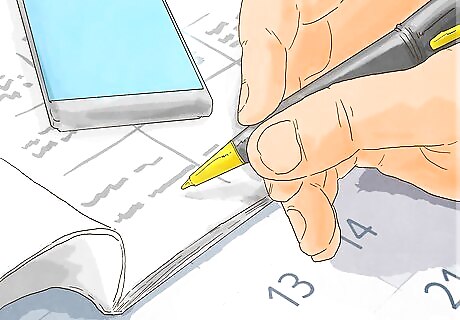
Find out when your hearing is scheduled. The clerk will schedule your hearing. In some counties this will be a preliminary hearing rather than the day of your final trial. The clerk will be able to tell you if you need to have any witnesses or evidence with you when you attend this hearing. If you don't attend your hearing, whether it is a preliminary hearing or a full trial, the court may dismiss your case.

Have the defendant served. The person you're suing must have notice of the suit at least 10 days before the hearing is scheduled. The clerk will attempt to serve the defendant for you. Service may be completed using certified mail or in person using the sheriff's department. If neither the clerk of court nor the sheriff can find the defendant in time, you may request a continuance until you can notify the defendant of the suit.
Preparing for Your Hearing

Attend a first hearing, if required. Some counties will have a first hearing to find out if the person you're suing is contesting your claim. If the defendant doesn't show up for this hearing after receiving proper notice of your claim, you may win by default without needing a full trial. If the defendant does show up and disputes all or part of your claim, the judge will schedule a full trial at a later date.
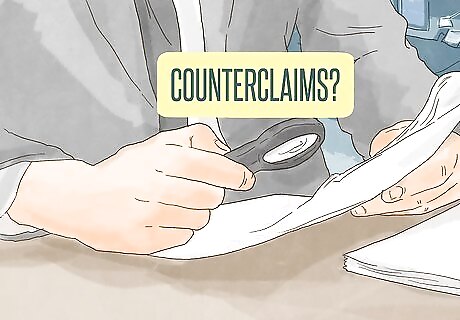
Review any counterclaims. If the person you're suing claims you actually owe him money or have caused him damages, he may file a counterclaim against you. If the defendant wishes to file a counterclaim against you, he must file it in time for the clerk to get a copy of the counterclaim to you at least seven days before trial. A counterclaim must meet the same requirements as your original claim, including the maximum dollar amount for damages that can be recovered in small claims court. If you do not receive a copy of the counterclaim at least seven days before the trial, you can request a continuance so you have time to read the counterclaim and prepare a response.

Participate in discovery. If the defendant has documents or information you need to build your case, he must share that information with you. The defendant also has the right to get information from you that he needs to build his defense. If the defendant has documents or information you need and refuses to share, you can request the judge order the defendant to give that information to you. The judge will issue such an order provided you have good reasons why you need the information. You also must be able to show that you asked the defendant for the information and the defendant refused to give it to you.

Consider consulting an attorney. Indiana allows you to consult an attorney about your small claims case. You also can have an attorney represent you in small claims court, although you likely will not be able to recover attorney's fees from the defendant. Corporations must be represented by counsel in small claims court. If you have an unincorporated business such as a sole proprietorship or a partnership, generally you can represent yourself as the owner of the business, and are not required to have an attorney. For example, suppose you own a coffee shop and hired an acoustic singer-songwriter to play a two-hour set every Thursday afternoon for a month. The singer-songwriter didn't appear for the last week, and you want to file a small claim against her to get back the money you'd already paid her. If you run your business as a sole proprietorship, you can represent yourself in small claims court. However, if you've incorporated as "Small Town Coffee, Inc.," you must hire an attorney to represent you at trial.

Attempt to reach a settlement. At any time before your hearing, you and the defendant may talk and decide to compromise on the claims. If you do reach a settlement, you should write it down, sign it, and file it with the court. The judge will approve your settlement and enter your agreement as his judgment for the case. This makes your settlement legally enforceable. If the defendant later refuses to pay you as agreed, you can get a court order for the money.

Organize all your evidence and witnesses. In anticipation of trial, talk to your witnesses and get all your evidence together. Make sure any witnesses you plan to call know when and where your trial will be held so they can show up at trial. Talk to them beforehand and ask them questions. Your witnesses should be prepared not only for questions you will ask, but for questions the judge or the defendant may ask them. If a witness whose testimony you need to prove your case doesn't want to come to your trial, you can ask the clerk to issue a subpoena ordering that person to attend. Make your request for a subpoena as soon as possible so there is plenty of time before trial. Get a binder or series of folders for your documents or other evidence that allows you to separate it by subject and label it so you can find it easily during trial without having to shuffle through your papers or disrupt the proceedings. If possible, make enough copies of any evidence you intend to present that you have one for yourself, one for the defendant, and one for the judge. Any exhibits you present to the judge will become part of the court record and won't be returned to you, so you should make copies if you need to keep the originals for any reason. Include copies of all documents you've filed with the court in your documents for trial.
Attending Your Hearing

Arrive at the courthouse early. You want to show up in plenty of time to park, get through courthouse security, and find the correct courtroom. Dress conservatively and professionally in clean, neat clothing. You don't necessarily have to wear a suit, but you should avoid wearing t-shirts, sweat pants, and other overly casual clothes. Review the courthouse rules before you go and make sure you don't take any items, such as cell phones or pocketknives, that are not allowed in the courtroom.
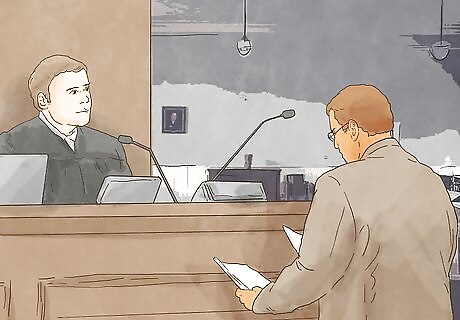
Present your case to the judge. As the plaintiff, you will present your case to the judge first. You may do this by testifying yourself, or by calling witnesses to testify on your behalf. If you have any evidence that supports your claim, such as receipts or written contracts, show those to the judge as you proceed. Keep your statements brief and stick to the facts – avoid emotional pleas or showing anger. Talk to the judge rather than the defendant, and don't ask the defendant any questions. If the judge speaks, you should stop speaking. As you present your case, the judge may ask you questions. If he does, stop speaking and listen to the question. Then answer that question before moving on to other statements you wanted to make. Although the trial is informal, you still are under oath and subject to penalties for perjury or contempt. You must prove to the judge by a preponderance of the evidence that the defendant did something that made him liable to you for damages, and that your damages are the amount you've claimed.

Listen while the defendant presents his case. After you've presented your case, the defendant will have the opportunity to present evidence or witnesses that tell his side of the story. Don't interrupt the defendant while he's speaking, or talk directly to him. If the defendant calls any witnesses, the judge may allow you to cross-examine them. This means you will be allowed to ask questions directly to the witnesses.

Make your final statement. When the defendant has finished presenting his case, the judge may give you both the opportunity to make a final statement summing up your claims. If the judge doesn't mention it, you may ask if you can make a final statement. Keep in mind this is in the judge's discretion, and he may refuse.
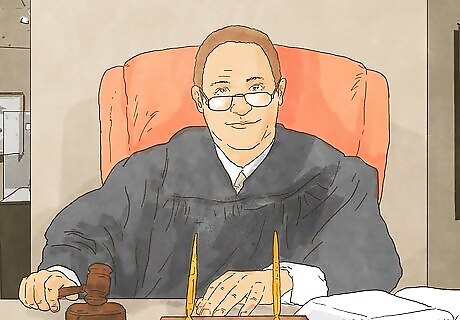
Wait for the judge's ruling. At the end of the trial, the judge will make a decision on whether the defendant owes you money for your claim. The judge may make his decision immediately at the end of the trial, or he may take the matter under advisement and make a decision at a later date. If this happens, the decision will be mailed to you. Once the judgment is recorded, it becomes a lien on any real property the defendant has in the county until the judgement is satisfied. If you win your lawsuit, any money awarded to you is your responsibility to collect. If you are not paid, you may file a form for supplemental proceedings. The court will schedule a hearing and make appropriate collections arrangements such as setting up a payment plan or having the defendant's wages garnished.



















Comments
0 comment